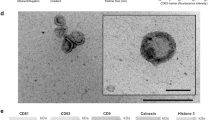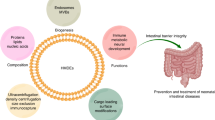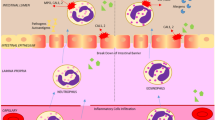Abstract
Summary: We have recently reported that the intestinal transport of intact macromolecules into the circulation decreases with age presumably due to maturation of mucosal barrier factors. To extend this observation and determine the effect of natural versus artificial feeding on maturation of intestinal mucosal “barrier function,” we conducted experiments which assessed both macromolecular transport and epithelial cell morphology.
To study barrier function, we gavage fed a physiologic quantity (100 mg) of bovine serum albumin (BSA) to weight-matched breast- and bottle-fed infant rabbits at 1 and 2 wk of age and quantitated intestinal macromolecular transport by measuring circulating plasma concentrations of the intact antigen 4 hr later. A significant decrease (P < 0.02) in immunoreactive bovine serum albumin (1-BSA) concentration was noted in breast-fed (6.12 × 0.77 μg I-BSA per ml plasma) compared with bottle-fed (9.19 × 0.93 μg I-BSA per ml plasma) animals at one wk. However, at 2 wk, no difference could be demonstrated between the two groups. Furthermore, small intestinal morphology evaluated by light and electron microscopy was similar in both groups at each age.
To determine if the lower plasma I-BSA noted at one wk in naturally fed animals was related to the presence of anti-BSA antibodies in breast milk and/or in plasma of the pups, breast milk and plasma from the breast-fed animals was evaluated by counter-immunoelectrophoresis and hemagglutination. No anti-BSA antibodies were detected. Moreover, plasma from breast- and artificially fed rabbits not gavage fed BSA contained no I-BSA.
These data suggest that intestinal transport of antigens in the immediate neonatal period is decreased earlier in breast- as compared to bottle-fed animals. Therefore, we suggest that breast milk may exert a protective function to control the transport of potentially antigenic molecules into the systemic circulation of newborn animals by either facilitating the early maturation of intestinal barrier function or by providing passive barrier factors until the newborn's natural barrier can develop.
Speculation: The intestinal transport of macromolecules. including potential antigens, decreases with maturation of the intestinal mucosal barrier. Natural feeding, when compared with artificial feeding, may accelerate growth and maturation of intestinal barrier function, thereby decreasing the intestinal transport of antigens. This decreased transport of antigens with breast feeding may offer protection to the allergy-prone or otherwise disease-prone infant. In addition, reduced antigenic exposure during infancy may decrease the likelihood of sensitization which could be harmful later should gastrointestinal defense mechanisms be compromised by intestinal disease.
Similar content being viewed by others
Log in or create a free account to read this content
Gain free access to this article, as well as selected content from this journal and more on nature.com
or
Author information
Authors and Affiliations
Rights and permissions
About this article
Cite this article
Udall, J., Colony, P., Fritze, L. et al. Development of Gastrointestinal Mucosal Barrier. II. The Effect of Natural Versus Artificial Feeding on Intestinal Permeability to Macromolecules. Pediatr Res 15, 245–249 (1981). https://doi.org/10.1203/00006450-198103000-00009
Issue date:
DOI: https://doi.org/10.1203/00006450-198103000-00009
Keywords
This article is cited by
-
Formula diet alters small intestine morphology, microbial abundance and reduces VE-cadherin and IL-10 expression in neonatal porcine model
BMC Gastroenterology (2016)
-
Oral tolerance is inefficient in neonatal mice due to a physiological vitamin A deficiency
Mucosal Immunology (2016)
-
Host Factors in Amniotic Fluid and Breast Milk that Contribute to Gut Maturation
Clinical Reviews in Allergy & Immunology (2008)
-
Characterization of antigens and allergens in hypo-allergenic infant formulae
European Journal of Pediatrics (1995)
-
Antigen processing and uptake from the intestinal tract
Clinical Reviews in Allergy (1984)



